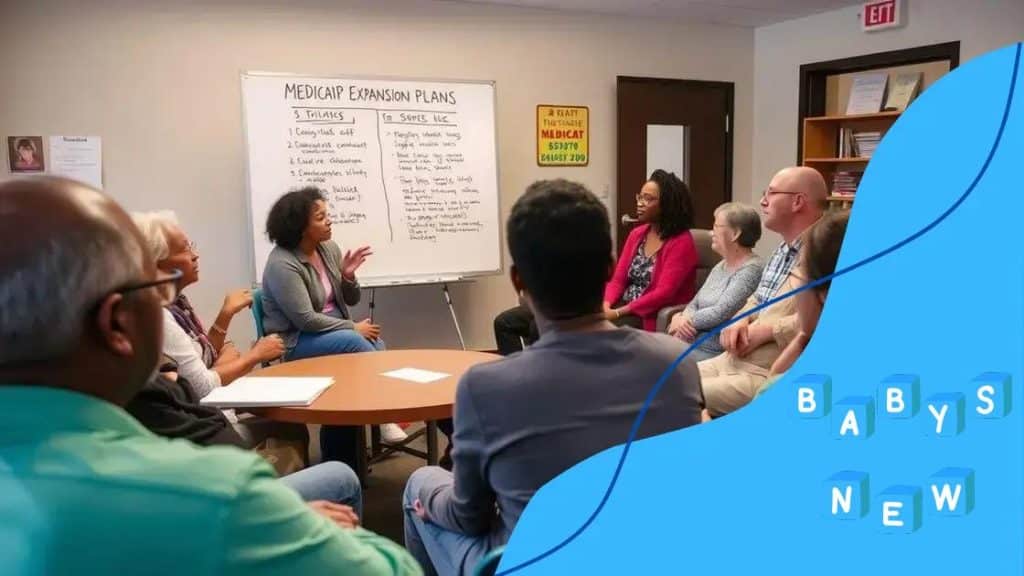The future of Medicaid expansion under new legislation

Advertisement
The future of Medicaid expansion under new legislation promises increased healthcare access for millions, enhanced coverage options, and potential long-term savings, while facing financial and public awareness challenges.
The future of Medicaid expansion under new legislation is a topic that has the potential to reshape healthcare for millions of Americans. With newly proposed changes on the table, it’s worth exploring what this could mean for you and your community.
Overview of the new legislation
The new legislation surrounding Medicaid expansion brings significant changes that could alter the landscape of healthcare access. Understanding the key features of this legislation is essential for anyone impacted by these reforms.
Key Features of the Legislation
This new bill introduces various elements that will affect how Medicaid operates. Here are some major points to note:
Advertisement
- Increased funding for states to support expansion.
- Eligibility criteria adjustments to cover more low-income individuals.
- Enhanced flexibility for states in managing their programs.
- New incentives for preventive care initiatives.
Furthermore, this legislation emphasizes the importance of community health services. By expanding the scope of what Medicaid can cover, it aims to improve overall public health outcomes. States will receive necessary resources to implement these changes effectively.
Impact on Residents
Residents can expect greater access to essential services, particularly those who previously fell through the cracks due to strict eligibility rules. With more individuals qualifying for Medicaid, families may gain peace of mind knowing that health services are more accessible.
Moreover, by investing in community-focused care, the legislation seeks to empower residents. This strategy fosters a healthier population by providing timely access to care, thereby reducing long-term healthcare costs.
Advertisement
The future of Medicaid under this new law promises progressive changes. While challenges remain in its implementation, the potential benefits are substantial. Stakeholders are now tasked with ensuring that these reforms translate into real-world improvements for those in need.
Impact on Medicaid recipients
The impact on Medicaid recipients under the new legislation is expected to be significant and far-reaching. Many people will gain access to essential services that they previously could not afford. Understanding these changes is crucial because they can directly affect the daily lives of millions.
Increased Coverage Options
With the new changes, many recipients will find new options available to them. This includes:
- Broader eligibility criteria, allowing more low-income individuals to qualify.
- Access to additional healthcare services, including mental health and preventive care.
- Streamlined application processes to make it easier to enroll.
Furthermore, the expansion aims to bridge gaps in healthcare access. Many families will now receive the medical attention they need, reducing the burden of unpaid medical bills and providing stability to their health outcomes.
Improved Health Outcomes
As recipients gain better access to care, the overall health of communities is likely to improve. Regular medical check-ups and preventative measures can prevent diseases from worsening. In turn, this leads to a reduction in emergency room visits, saving both time and resources.
Moreover, these positive developments can contribute to the economy. Healthier individuals are often more productive, leading to increased workforce participation. As Medicaid recipients receive necessary treatments, they can lead healthier lives and actively engage in their communities.
The anticipated changes hold promise for millions of Medicaid recipients. However, continued advocacy and support are essential to ensure that these new benefits are fully realized and accessible. Stakeholders must work together to address any challenges that arise during the implementation of these reforms.
Challenges in Medicaid expansion

The challenges in Medicaid expansion are significant and multifaceted. As the new legislation rolls out, various obstacles may impede its success and the overall goals of improved healthcare access.
Financial Constraints
One major challenge is the financial burden on states. Expansion requires substantial funding, and not all states may have the resources to meet this demand. Without adequate support, states could struggle to implement the necessary changes effectively.
- Potential shortfalls in state budgets.
- Uncertainty regarding federal funding and support.
- Increased costs for healthcare providers due to higher service demand.
Furthermore, these financial issues can create uncertainty for both recipients and healthcare providers. When states face budget constraints, it may affect the quality and availability of services provided to Medicaid recipients.
Public Awareness and Education
Another challenge lies in public awareness and education about the new provisions. Many eligible individuals remain unaware of their rights and benefits under the expanded program. This lack of understanding could prevent people from taking advantage of the resources available to them.
Efforts to improve outreach and education are essential. Communities must be informed about the changes and how they can benefit from them. Building awareness can lead to higher enrollment rates and better health outcomes for those in need.
Resistance from political entities may also hinder Medicaid expansion efforts. Some politicians may oppose it due to ideological beliefs or concerns about increasing government spending. This can lead to legislative delays and diluted reforms.
Addressing the challenges in Medicaid expansion requires collaboration among state officials, healthcare providers, and community organizations. Only by working together can these barriers be overcome and the benefits of expansion maximized.
Financial implications for states
The financial implications for states regarding Medicaid expansion are significant and varied. As states decide whether to implement the expansion, they must weigh the costs against potential benefits. The financial landscape will influence how health services are delivered and accessed.
Initial Costs and Budget Impact
Initially, states face substantial costs to expand Medicaid. This includes:
- Increased enrollment leading to higher expenditures for healthcare services.
- Funding infrastructure improvements to accommodate the additional recipients.
- Potential adjustments in state budgets to cover these costs.
While the federal government provides support, states must consider how to manage their budgets effectively. In some areas, the upfront costs may deter expansion despite long-term benefits.
Long-term Savings
Despite the initial financial strain, expanding Medicaid could lead to long-term savings. Access to preventive care can reduce emergency visits, ultimately saving money for both states and taxpayers. Healthier populations often require less frequent and costly interventions.
Additionally, states benefit from reduced unpaid medical bills as more residents gain insurance. This can help local economies flourish as people are more financially stable when they can access necessary healthcare.
However, the success of these long-term savings depends heavily on managing the transition effectively. States need to track spending and adapt quickly to ensure they are maximizing the benefits of the increased funding.
The analysis of the financial implications for states must include collaboration with healthcare providers, policymakers, and community organizations. Understanding the long-term costs and savings is crucial to making informed decisions about Medicaid expansion.
Future outlook for healthcare access
The future outlook for healthcare access is promising, particularly with the anticipated changes from Medicaid expansion. As more states consider and implement these reforms, we may see significant shifts in how healthcare is accessed by millions.
Increased Accessibility
With the expansion, many eligible individuals will gain access to vital services. This includes:
- Enhanced coverage for low-income families.
- Improved preventative care options leading to better health outcomes.
- More funding for community health resources.
These enhancements are likely to lead to a healthier population overall. States that embrace these changes can create an environment where medical resources are more readily available to those in need.
Innovation in Healthcare Delivery
The outlook also includes potential innovations in how healthcare is delivered. Technology will play a significant role in improving accessibility. For example, telemedicine has become prominent, allowing patients to consult healthcare providers from home. This can be particularly beneficial for rural areas where access to healthcare facilities is limited.
As states invest in technological advancements, we may expect streamlined processes for enrollment and healthcare service delivery. This can help reduce barriers typically faced by Medicaid recipients.
Moreover, partnerships between healthcare providers and community organizations are likely to increase. These collaborations can enhance education and outreach, ensuring that the target populations understand their coverage options and benefits.
Ultimately, the future outlook for healthcare access will depend on the successful implementation of Medicaid expansion and the commitment of stakeholders to address existing challenges. With focused efforts, it is possible to create a more equitable healthcare system.
In conclusion, the future of Medicaid expansion holds great potential for improving healthcare access for millions of Americans. The changes brought by the new legislation can lead to increased coverage, better health outcomes, and innovative solutions in healthcare delivery. However, challenges remain, including financial constraints and public awareness. By addressing these issues collaboratively, stakeholders can ensure that the benefits of Medicaid expansion are fully realized, creating a healthier and more equitable society.
\n\n\n
\n
\n
FAQ – Frequently Asked Questions about Medicaid Expansion
What are the main benefits of Medicaid expansion?
The main benefits include increased access to healthcare, improved health outcomes, and financial stability for low-income families.
How will Medicaid expansion impact state budgets?
While initial costs may increase, Medicaid expansion can lead to long-term savings through reduced emergency care usage and better health management.
What challenges might states face during the expansion?
States may encounter financial constraints, public awareness issues, and political resistance that could slow down implementation.
How does technology play a role in Medicaid expansion?
Technology facilitates better healthcare delivery through telemedicine and streamlined processes, making services more accessible to patients.





